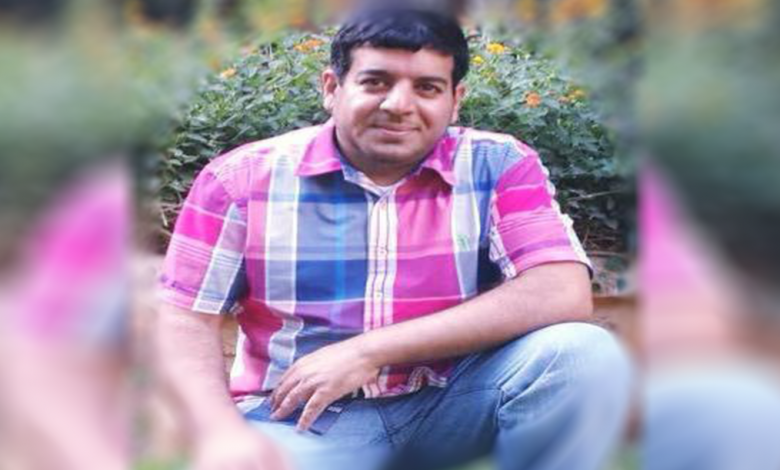The United Nations condemns the arbitrary detention of a Saudi opinion activist

The United Nations Working Group on Arbitrary Detention published an opinion on its website about Hussain bin Abdullah bin Yusuf al-Sadiq, from Tarut Island in the Eastern Province of Saudi Arabia.
Hussain is 47 years old and is currently being arbitrarily detained in Saudi Arabia. Al-Sadiq was a Saudi social activist in religious associations, voluntary charitable committees, and organizing religious and cultural events, activities, and lectures in Qatif.
Hussain was summoned to the Tarut police station and arrested without a warrant. He was falsely charged with insulting the king and the Government during a conversation with the mayor of Tarut. He was
sentenced to 9 years in prison in 2018; the number of years increased to 13 after an appeal in 2021.
Americans for Democracy & Human Rights in Bahrain (ADHRB) regularly receives information from Saudi individuals through its UN complaints program.
The documents collected by ADHRB were the source of the information on which the Working Group based its opinion on Al-Sadeq’s case.
The Working Group emphasized that Al-Sadiq’s detention was arbitrary due to clear violations of due process and fair trial rights, as well as its connection to the exercise of his right to freedom of thought, opinion and expression, which makes his detention a discriminatory act.
Given the gravity of the violations, the Working Group referred its case to the Special Rapporteur on torture and other cruel, inhuman or degrading treatment or punishment, the Special Rapporteur on the independence of judges and lawyers, and the Special Rapporteur on freedom of religion or belief, for appropriate action.
In Opinion No. 62/2022, adopted on September 2, 2022, the Working Group identified the multiple articles under which Al-Sadiq’s deprivation of liberty falls and which also revealed violations of international laws and standards.
As such, the Working Group requested the Government of Saudi Arabia to take the necessary steps to rectify Al-Sadeq’s situation without delay and align it with relevant international standards.
The working group identified the appropriate procedures in this case as follows:
“Release Mr Al-Sadiq immediately and grant him an enforceable right to obtain reparation and compensation under international law. In the current context of the global coronavirus pandemic and the threat it poses in places of detention, the Working Group calls on the Government to take urgent action to ensure the immediate and unconditional release of Mr Al-Sadeq.”
ADHRB welcomes this Opinion by the WGAD and urges the Saudi authorities to provide AlSadeq with adequate reparations and compensation for his arbitrary detention and the violations he suffered, in addition to holding the perpetrators of those violations accountable.
The WGAD is one of the Special Procedures offices of the UN Human Rights Council. As part of its regular procedures, the Working Group sends allegation letters to governments concerning credible cases of arbitrary detention. The Working Group may also render Opinions on whether an individual or group’s detention is arbitrary and in violation of international law.
The WGAD reviews cases under five categories of arbitrary detention: when it is clearly impossible to invoke any legal basis justifying the deprivation of liberty (Category I); when the deprivation of liberty results from the exercise of the rights to equal protection of the law, freedom of thought, freedom of opinion and expression, and freedom of assembly, among others (Category II); when violations of the right to a fair trial are so severe that the detention is rendered arbitrary (Category III); prolonged administrative custody for refugees and asylum seekers (Category IV); and when the detention is discriminatory on the basis of birth, national, ethnic or social origin, language, religion, economic condition, political or other opinions, gender, sexual orientation, disability, or any other status (Category V).
In its Opinion No. 62/2022, the Working Group found that AlSadeq, currently held in Mabahith prison in Dammam carrying out his 13-year sentence, had suffered a range of human rights violations throughout his detention; AlSadeq was warrantlessly arrested, he was not granted access to legal counsel to prepare for his trial, he was interrogated in the absence of a lawyer, he was not allowed to present evidence in his own defense, he was not brought promptly before a judge (he was only tried two years after his arrest), and his confession extracted through torture was used against him in trial.
The Working Group determined that AlSadeq’s warrantless arrest on 1 October 2015 violates article 9 of the Universal Declaration of Human Rights, and articles 9 and 14 of the Covenant. It further determined that AlSadeq was not allowed to hire a lawyer for the first two years of his arrest. When he was finally allowed to appoint a lawyer, the latter could not request a session with his client and could only see him in court, hindering his ability to prepare for trial. AlSadeq was held in solitary confinement and incommunicado detention during a period of investigation of three months at Mabahith prison, where he allegedly confessed to the charges attributed to him under torture.
Since the Saudi government did not provide an adequate response to the raised allegations, instead relying on general statements which did not specifically address AlSadeq’s warrantless arrest and detention, the Working Group found that AlSadeq was not able to challenge the legality of his detention, a violation of articles 8 and 10 of the Universal Declaration of Human Rights. Moreover, the Working Group concluded that the Government failed to establish a legal basis for AlSadeq’s arrest, rendering his detention arbitrary under Category I.
Additionally, the Working Group recalls that article 29 (2) of the Universal Declaration of Human Rights provides that the only legitimate limitations to the exercise of one’s rights and freedoms must be for the purposes of securing due recognition and respect for the rights and freedoms of others and meeting the just requirements of morality, public order and the general welfare in a democratic society. The Working Group notes the failure of the Government to explain how the actions of AlSadeq required the imposition of any restrictions under the justifications listed in Article 29 (2) of the Universal Declaration. In fact, the Government has provided no account of any actions of AlSadeq which may have amounted to a criminal act. The Working Group thus found that AlSadeq’s deprivation of liberty falls under Category II.
The Working Group emphasized that no trial should have taken place against AlSadeq. Despite this, AlSadeq was tried and convicted, and received a lengthy imprisonment term of 13 years, and his due process rights were violated. AlSadeq was also denied legal assistance for the first two years of his detention, a right enshrined in articles 10 and 11(1) of the Universal Declaration of Human Rights and principles 17 and 18 of the Body of Principles for the Protection of All Persons under Any Form of Detention or Imprisonment. This, along with the government’s repeated interrogation of AlSadeq without the presence of legal counsel and whilst in incommunicado detention, renders the violations of the fair trial rights suffered of such gravity that his detention constitutes a Category III deprivation of liberty.
Finally, the Working Group found that AlSadeq was arbitrarily detained under Category V. The Working Group notes that AlSadeq’s personal views and convictions are clearly at the center of the present case and that the authorities have displayed an attitude towards him that can only be characterized as discriminatory. Indeed, he has been the target of persecution and there is no explanation for this other than his exercise of the right to express such views and convictions.
In its concluding remarks, the Working Group noted they are disturbed at the allegations that the family of AlSadeq was not informed of his arrest and subsequently was allowed very limited contact with him, allegedly due to COVID-19 restrictions. Moreover, the Working Group highlights that in its 31-year history, they have found Saudi Arabia in violation of its
international human rights obligations in over 65 cases. The Working Group calls upon the Government to take urgent action to ensure the immediate unconditional release of AlSadeq.
ADHRB echoes the requests made by the Working Group for AlSadeq’s immediate release and for appropriate measures to be taken against those responsible for the violation of his rights, in addition to AlSadeq receiving proper reparations for his arbitrary detention.





